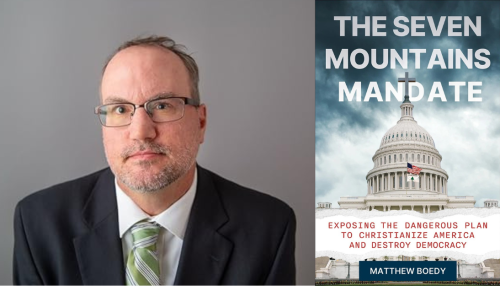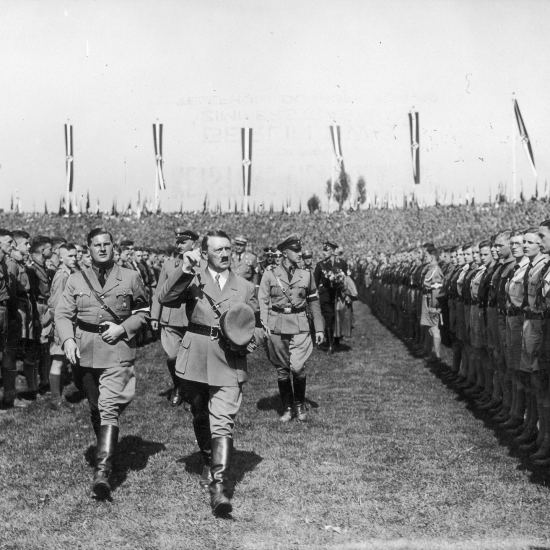
NOTE: This piece was originally published at our Substack newsletter A Public Witness.
Matthew Boedy had a warning to share with both church and society: A previously fringe movement that sought to reconstruct the United States as a Christian nation by installing leaders committed to its ideology in spheres of cultural influence was becoming mainstream. He wrote The Seven Mountains Mandate: Exposing the Dangerous Plan to Christianize America and Destroy Democracy to alert those who were ignorant or complacent about what was going on and what was at stake.
He drew a line from its emergence in fundamentalist and conservative evangelical subcultures in the 1970s to the present day, where it had a new champion who was rising in fame and power. Charlie Kirk and his organization, Turning Point USA, were advancing an agenda that radically challenged how our nation understood the relationship between religion and politics. Following Kirk’s assassination on Sept. 10, both the meaning and the purpose of the book have changed.

Boedy called the killing “heinous” and said that “his death is a national moment, a line we have crossed that is deeply sad.” Yet, he has also been critical of the posthumous lionization of Kirk because, “We can see throughout the history of the church [that] using martyrdom often rallies people to go after their enemies. And so martyrdom creates a legacy of really reinforcing people’s beliefs and reinforcing their anger, reinforcing their desire for vengeance.”
We have seen some of those fears come true, as publicly criticizing Kirk’s words, actions, and agenda brought fierce consequences. Jimmy Kimmel was temporarily booted off the airwaves. Workers in both the public and private sectors were fired from their jobs. Social media interactions devolved into shouting matches. Pastors were criticized for not lauding Kirk in worship services.
These debates about the principles of our democracy, the role of religion in public life, and what’s tearing our social fabric apart have transformed Boedy’s argument from interesting to urgent. They started well before Kirk emerged on the national stage and will continue long after his death. Boedy’s book helps explain and contextualize the theological-political project that animated much of Kirk’s work and will be continued by others in his absence.
My suspicion is that concepts like “Christian Reconstructionism” or the “Seven Mountains Mandate” are unfamiliar to most people, including those who spend Sundays inside church sanctuaries. I first learned about Reconstructionism in college and was quite dismissive of it, wondering why others were trying to focus my attention on far-fetched ideas.
It’s because the promoters of those ideas were serious about their project to ensure that Christians of a specific type exercised “dominion” in seven institutions: education, family, religion, government, business, media, and entertainment. They believed God had blessed their mission. Through the years they continued building support and persevering through opposition. The vision has remained, even as the hoped for manifestations and specific means have changed. The future of the country and the future of Christianity were at stake.

For committed Christians, the question naturally follows: Isn’t that what we should want? Isn’t the idea of Christians serving God and serving others in the highest possible places with the widest available reach what Jesus calls us to do?
As the saying goes, “The devil is in the details,” and Boedy shares details that are quite devilish. The events and intentions he describes are not sacrificial leadership in service to democratic ends and universal human flourishing. It’s a fusion of far-right Christianity with authoritarian politics that seeks to impose a worldview and control how the lives of others are structured.
Indeed, he writes this book not only as a Christian and an expert in religious rhetoric, but also as someone who has experienced firsthand the costs of being at odds with this movement’s aims. His advocacy against gun violence caught the ire of Turning Point USA and led to Boedy being named to a “watchlist” of professors purportedly pushing “anti-American values” and “leftist propaganda.” The effort to undermine free speech led to the harassment of professors and controversies on campuses.
As I read Boedy’s book, he isn’t seeking to silence or caricature his opponents. He respects them enough to seriously engage with their words, actions, and goals. It’s his contribution to our democratic life and an attempt to foster healthy discussions about who we want to be. Those are goals Kirk would have affirmed, even if he and Boedy may have sharply disagreed about the direction our nation — and the churches within it — should go.
Boedy has generously agreed to send an autographed copy of The Seven Mountains Mandate to a lucky paid reader of A Public Witness. So upgrade your subscription today to ensure you’re eligible for that drawing at the end of the month.
As a public witness,
Beau Underwood






